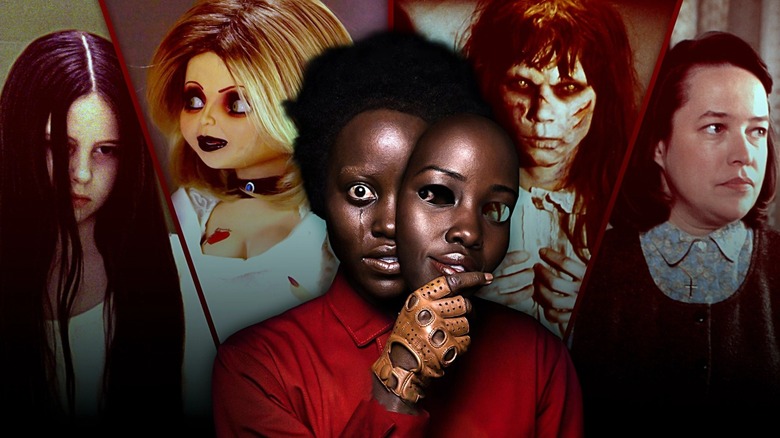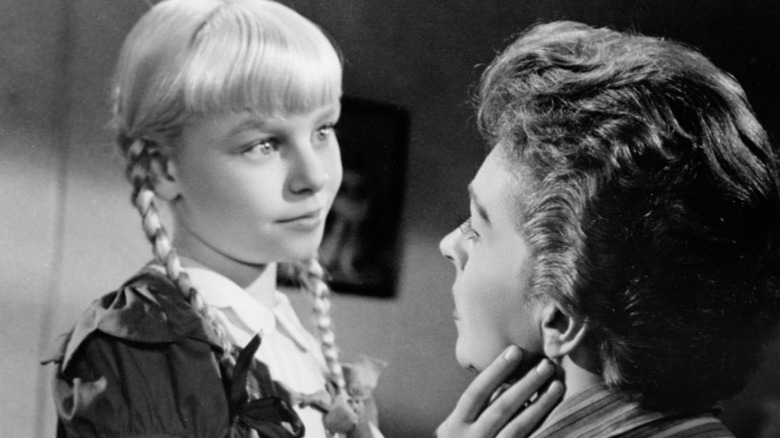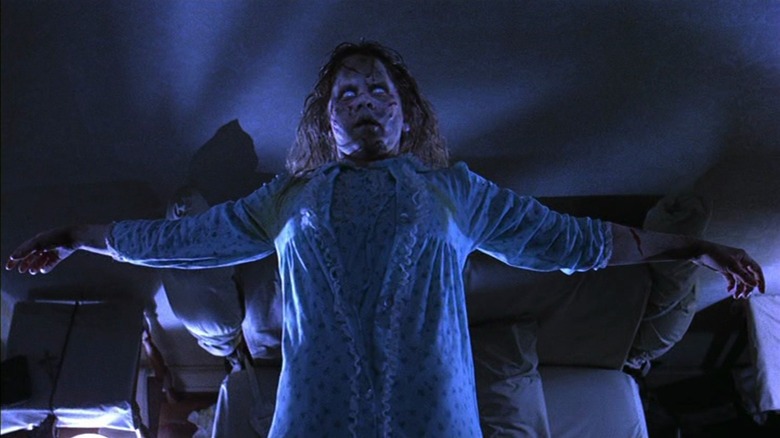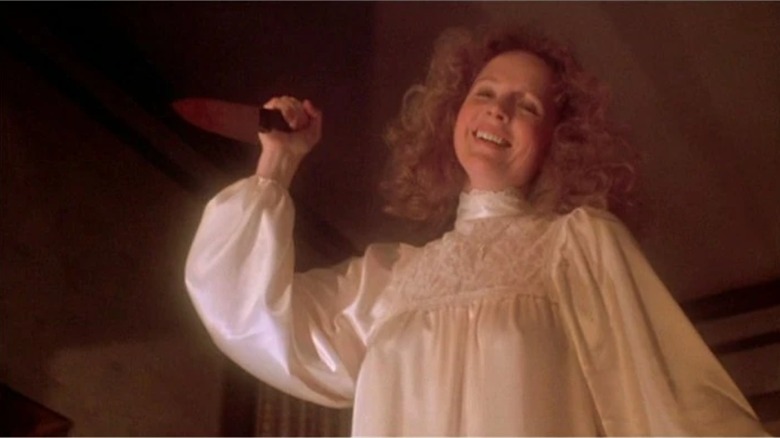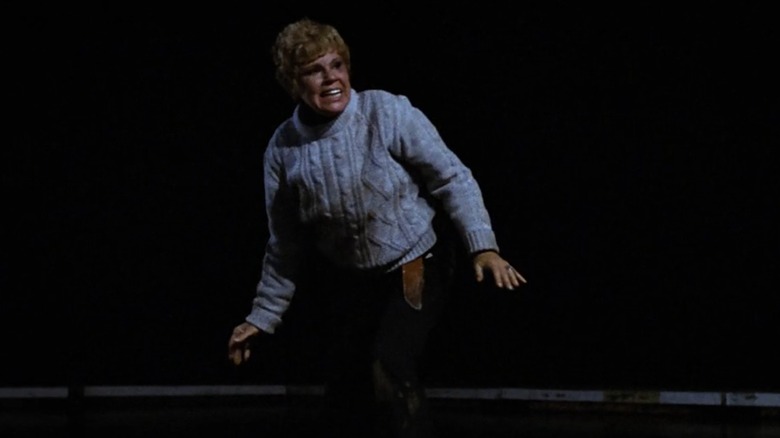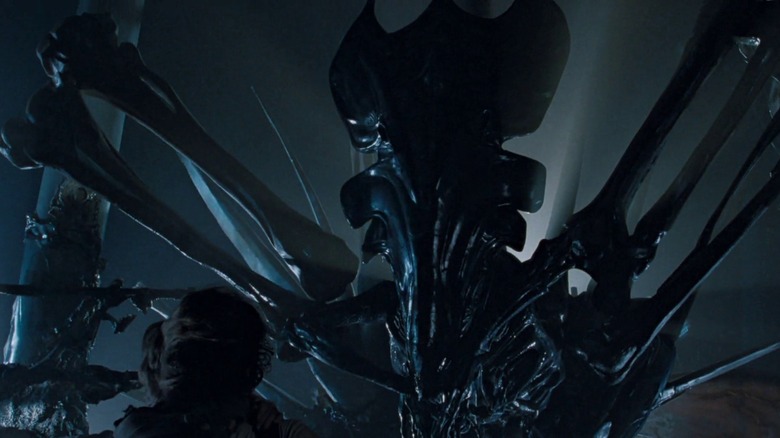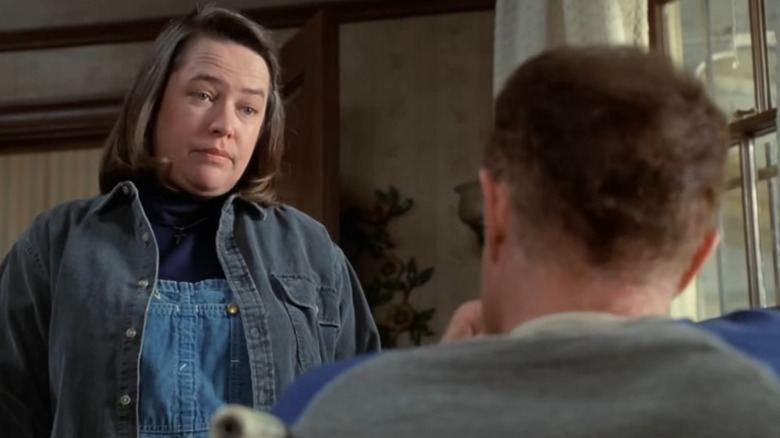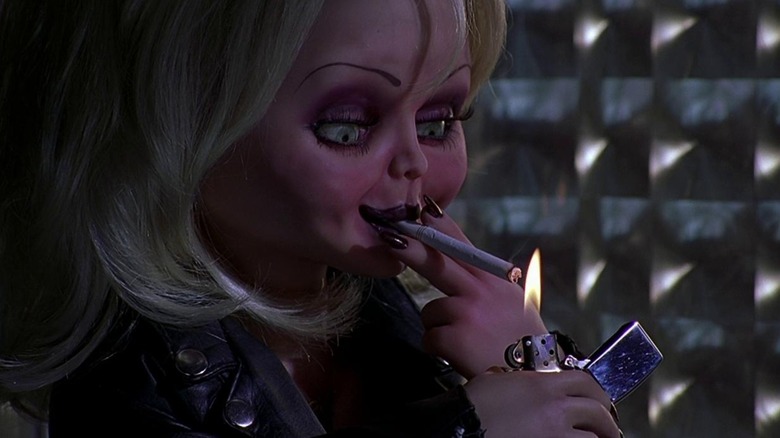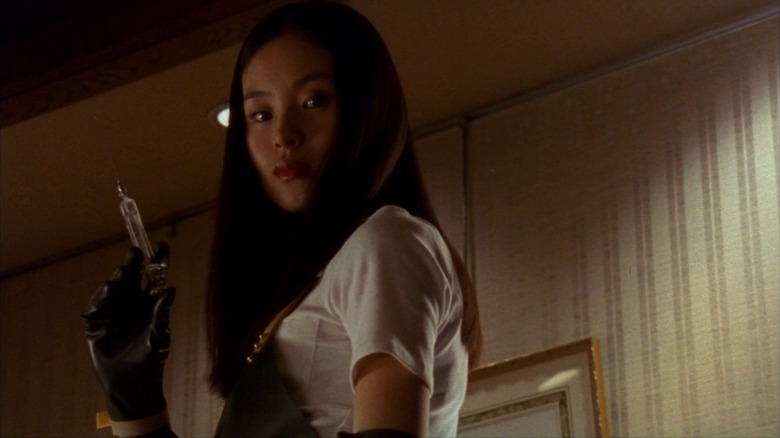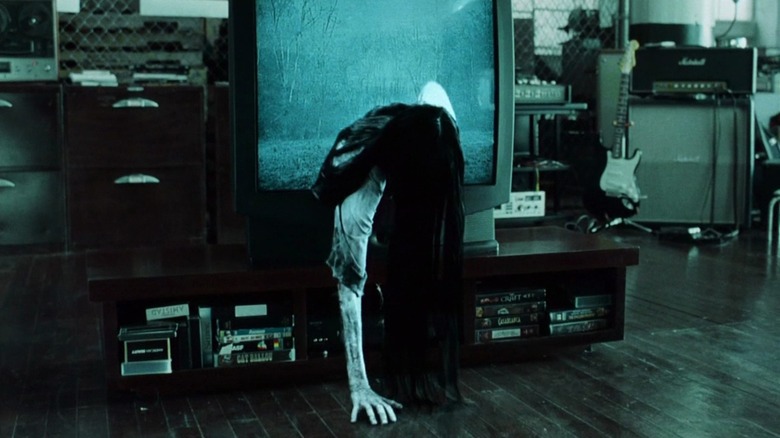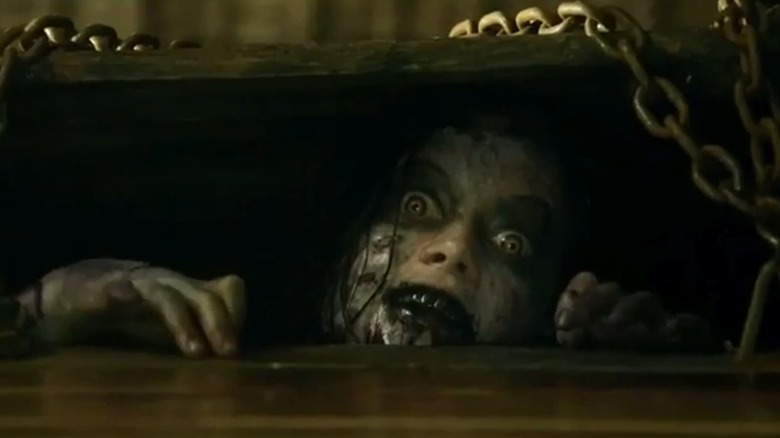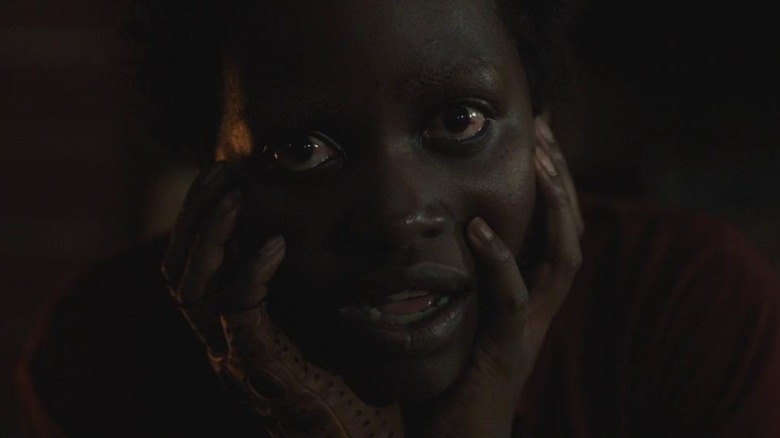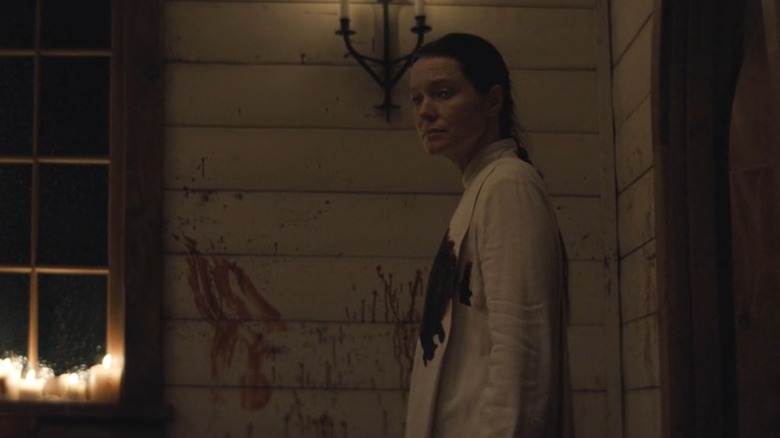The 12 Scariest Female Horror Villains
Sometimes we tend to think of horror as a male-dominated genre; after all, from Michael Myers and Chucky to Jason Voorhees and Freddy Krueger, most of horror's biggest villains have been men. In her seminal book "Men, Women, and Chainsaws," Carol Clover codified the idea of the "Final Girl," pointing out that in many horror movies, we're asked to identify with female victims as they face often-sexualized aggression from male killers. (For the record, here's our ranking of the 15 best final girls in horror movies).
Sometimes, though, certain horror movies flip that usual dynamic on its head. In the right project, some excellent actors have been able to take female characters and make them into some of the most terrifying villains the genre has ever seen. Occasionally, women who lead horror movies have even been able to break through the awards season curse that usually haunts the horror genre; other times, their performances are so underrated that fans still talk about how they were robbed of recognition.
The best female horror villains have been creepy dolls and possessed children, religious fanatics and fanatical fans. Horror is full of women scorned, and sometimes those scorned women want revenge, simple as that and more power to 'em. Read on for a look at the 12 scariest female horror villains of all time.
Rhoda from The Bad Seed (1956)
Horror is full of creepy kids; in fact, creepy-kid horror movies are a subgenre all their own, and you'll find a few more on this very list. Few, though, are as creepy as one of the very first to ever do it: Rhoda from "The Bad Seed." Patty McCormack was a young child when she first played Rhoda onstage, returning several years after her Broadway debut to bring the blonde brat in the braided pigtails to the big screen.
Rhoda looks like the picture of innocence, a sweet and adorable little girl who probably seemed like the ideal child in postwar, midcentury America. Make Rhoda mad, though, and you may find that she's flashing those eyes at you in an entirely different way. Make Rhoda mad enough, and she might even kill over it. The movie is beautifully photographed in black and white, and when it finally heats up and her parents come to realize just what kind of kid they're raising, little Rhoda is downright terrifying.
McCormack played the sociopathic villainess so well, in fact, that she was nominated for Best Actress in a Supporting Role at the Academy Awards, one of the youngest nominees ever. The role of Rhoda followed her for the rest of her life. As she explained to The Los Angeles Times, "I have a feeling that part of Rhoda was so indelible when I was young that afterward I had a rough time sitting on some of my strengths."
Regan from The Exorcist (1973)
Almost two decades after Patty McCormack terrified audiences in "The Bad Seed," Linda Blair took creepy kids to a whole new level when she played Regan in "The Exorcist." You might disagree with the idea of Regan being the villain of that movie; after all, she's a possessed child, making her more like a victim and the demon Pazuzu more of the villain. Still, "The Exorcist" draws so much of its horror from the fact that Regan is specifically a young girl, and she's a young girl who's growing up.
We as the audience know she's possessed, but it takes her mother Chris (Ellen Burstyn) a long time to believe that that's what's going on; in the meantime, you can easily read this movie as a representation of the way that some parents are horrified when they realize that their children are becoming adults. In Regan's case, that means lots of new and frightening bodily fluids, a burgeoning interest in sexuality, and a willingness to use filthy words she wouldn't otherwise say. We're horrified when we see children behaving this way whether their heads are spinning and they're spewing green bile or not, and Blair's performance of the rotting girl makes Regan brilliantly scary.
Margaret White from Carrie (1976)
At the end of Brian DePalma's 1976 film "Carrie," the titular telekinetic teenager (Sissy Spacek) is bullied at prom, locks the doors, and has her revenge. The sequence is terrifying, but it's a complicated one, because Carrie isn't a villain. She's the protagonist, a sweet girl who doesn't understand why she doesn't fit in. As she comes into her power — as a woman and as someone who can move things with her mind — Carrie learns to stand up for herself. It's gruesome, but it's an empowering image, too. It's wish fulfillment for any kid who ever felt like an outcast.
Carrie's mother Margaret White (Piper Laurie), on the other hand, is pure evil. Margaret has raised Carrie to be so sheltered from the world, so cut off from the reality of what it means to be a teenager, that Carrie is unaware of her own bodily functions. She's a religious fundamentalist, a woman so gripped by fervent psychosis that she locks her misbehaving daughter in a closet and makes her pray for forgiveness.
Laurie is so dialed in to this character that her line readings are utterly chilling. She's one of the best performers to ever tackle Stephen King's idiosyncratic dialogue, which often twists childish turns of phrase into something ominous. "I can see your dirty pillows," she deadpans to her daughter when she wears a low-cut prom dress, and it sounds so sinister that it hits like a slap across the face.
Pamela Voorhees from Friday the 13th (1980)
Jason Voorhees may now be one of the most infamous slasher villains of all time, but as Drew Barrymore's character Casey Becker is brutally reminded at the beginning of "Scream," Jason wasn't actually the killer in the first "Friday the 13th." In that first movie, Jason was just a little boy who drowned long ago at Camp Crystal Lake, a mentally-handicapped camper who lost his life because his counselors were off being horny, irresponsible teenagers instead of watching him.
That's why, years later, his mother Pamela is out for revenge. Driven mad by the grief of losing her son, Pamela slices and dices counselors from one end of the camp to the other. When she finally reveals herself at the end, actor Betsy Palmer's unique mix of sadness and rage makes her one of the most frightening female horror villains ever. Dressed in a simple cable-knit sweater, she looks like the kind of mom who might bring oatmeal raisin cookies to a game of bridge with her friends; the only problem is, she's wielding a machete instead. Palmer delivers her lines as though her method of retribution is the most common-sense thing in the world, making it clear that this is a woman completely detached from reality and willing to do anything to do right by her boy ... her Jason ...
The Alien Queen from Aliens (1986)
"Alien" is a franchise full of revolting sexual nightmares, a series that is working through cultural anxieties around rape, pregnancy, abortion, and the deep body horror of being forced to carry a being inside of you until it bursts out. There are eggs everywhere, long appendages that deposit seeds where they aren't wanted, and a whole lot of creatures that, in various forms, look incredibly phallic.
In "Aliens," James Cameron's sequel to the original Ridley Scott film, Ellen Ripley (Sigourney Weaver) is forced into a motherhood role. She was an icon of androgyny in the original film, a tough-talking woman comfortable wandering around her ship in briefs. In "Aliens," her instinct to protect — applied mostly to a cat in "Alien" — takes on a whole new dimension when she rescues a little girl called Newt (Carrie Henn). She's the last survivor of a devastating massacre on a remote colony, and soon Ripley realizes that she's going to have to go up against a mother of a different sort if she wants her surrogate daughter to survive.
This time, Ripley comes face-to-face with an alien queen, a much larger and more terrifying version of the same xenomorph she battled in the first film. This one has a lot more legs, a much bigger head, and worse, it seems to recognize a kinship in Ripley as a fellow mother. This mother just so happens to be capable of spawning an army of killing machines.
Annie Wilkes from Misery (1990)
Piper Laurie is one of the best performers to have tackled Stephen King's trademark dialogue, but Kathy Bates is perhaps the best to ever play a King character. In Rob Reiner's 1990 adaptation of "Misery," she stars as Annie Wilkes, a voracious reader who just so happens to find her favorite novelist on the side of the road, his car covered in snow. Annie used to be a nurse, and now she wants to nurse Paul Sheldon (James Caan) back to health. And hey, while she's got him in her house for a while, what's the harm if she keeps him there, forcing him to write a book just for her? What's the big deal if she takes a sledgehammer to his ankles to make sure he's not going anywhere?
Annie Wilkes is a woman who has trouble controlling her emotions. Bates is frightening when Annie yells, but she's maybe even scarier during her depressive periods, when she can do little more than shuffle through her home, dead-eyed, emptying Paul's bedpan. Just as Laurie turned a remark about "dirty pillows" into something withering, Bates dials up the insanity, chewing into off-kilter lines like "He didn't get out of the cock-a-doodie car!" until they seem like the genuine rantings and ravings of a madwoman. For doing such a brilliantly batty job, Bates won a Best Actress Oscar, one of a select few given to horror performances. It was well-deserved.
Tiffany from Bride of Chucky (1998) and beyond
Brad Dourif's performance as the voice of Chucky is one of horror's best villain turns, and in the fourth "Child's Play" film "Bride of Chucky," Dourif finally met his match. In that movie — in which the series takes a turn for the comedic — Jennifer Tilly joins the recurring cast as the voice of Tiffany Valentine. Tilly fits perfectly into this utterly-insane universe, her iconic gravelly, yet-coquettish voice somehow seeming natural as it comes out of a gleefully-evil blonde toy.
In the decades since the movie's release — thanks, in part, to a series of sequels that never lost their shine and a great SyFy television show — Tiffany has become one of horror's most enduring camp icons. She's fabulously filthy, the kind of gal who'll happily show her man a good time ... and by that, we mean a joint killing spree. Though she can turn a look, she's also as bloodthirsty as her counterpart; after quipping "Heads up!" in "Seed of Chucky," she yanks on the other end of some piano wire, slicing off a man's head. What killer doll wouldn't want a woman like that by his side?
Asami from Audition (1999)
Even though "Audition" director Takashi Miike loves making horror films, he doesn't often watch them. The man is apparently a bit of a scaredy-cat when it comes to watching frightening films on screen, but he's happy to direct some seriously squelchy action from behind the camera. With "Audition," Miike made a movie about a woman who has no such qualms about watching people in pain. In fact, she spends her time devising all sorts of torturous ways to make her victims miserable.
Eihi Shiina plays Asami, a woman who is tricked into auditioning for a man (Ryô Ishibashi) under false pretenses. Though she thinks they fall in love, she realizes he's not as devoted to her as he said he would be, and Asami sets about exacting her revenge. Using implements like a long syringe, a wire saw, and the most disgusting appearance of a dog food bowl in cinema history, Asami endeavors to make sure this man knows just how much he hurt her. You'll hurt, too, after watching the way this one ends.
Samara from The Ring (2002)
"The Ring" has some of the best cinematography in horror, and it has one of the best female villains, too. When the Gore Verbinski film hit American theaters in 2002, it kicked off a wave of interest in Asian horror films that would come to define the decade. The movie was a remake of a Japanese film from 1998, and both feature the story of a little girl (Daveigh Chase) who finds herself at the bottom of a well. You know this story; there's a creepy video tape full of frightening imagery, and when you watch it, you get a call telling you that you have seven days to live. Once your time is up, that little girl crawls out of your television and makes good on her promise.
Like several of the other villains on this list, Samara (or Sadako, as she's called in the Japanese franchise) is so upsetting precisely because she's also a victim. Something truly traumatic happened to her, and now, from beyond the grave, she enacts that same evil on others. The long hair in front of her face hides just how water-logged and bloated she truly is, and by the time you see what lurks behind those long locks, it's too late; you've been literally scared to death.
Mia from The Evil Dead (2013)
In the 2013 update of "The Evil Dead," Jane Levy plays Mia, a woman battling a heroin addiction. As the film opens, her friends bring her out to a cabin in the woods, planning to stay with her and help while she goes through withdrawal. Unfortunately, there's a whole lot of demonic activity going on in those woods, and soon Mia isn't just struggling under the weight of her addition; she's also battling The Taker of Souls, an evil entity that appears first as a doppelganger and then takes over her body. Once again we're conflating a sympathetic character and the villainous thing that possessed her, but either way, the glory is all Levy's.
Then known mostly as the star of the criminally-underrated sitcom "Suburgatory," Levy shocked fans with her committed performance as a woman on the brink of oblivion. Thanks in part to the assistance of some genuinely-gnarly makeup effects, Mia turns into a snarling maelstrom of mayhem, a woman hell-bent on death and the destruction of not just everyone's bodies but their souls.
Red from Us (2019)
Jordan Peele's "Us" imagines a secret shadow world underneath our own. We have doubles down there, people who "tether" us to the other world by sharing our souls, and occasionally they want to come out and play. The movie follows a family led by Addy (Lupita Nyong'o) and Gabe (Winston Duke), and as the movie progresses they start to be tormented by their "tethered" from down below. Ultimately, Addy looks herself in the face when she meets Red, a lookalike desperate to join the world above.
Red is, simply put, terrifying. Nyong'o's voice is already relatively low, but she drops down into an even lower register as Red, speaking in a tone that sounds like rocks being scraped together. She's the wide-eyed embodiment of desperation, of an all-encompassing hunger to take over Addy's life. She speaks slowly, haltingly, like she hasn't used her voice in decades; as the tethered move against Addy's family, her growing glee is deliciously upsetting.
That's all to say that Nyong'o turns in one of the best horror performances ever; it should've won an Oscar. Despite playing a lookalike, it's an utterly transformative performance, and Red is utterly unforgettable.
Bev Keane from Midnight Mass (2021)
Many of the best Mike Flanagan movies are Stephen King adaptations. He's behind "The Life of Chuck," "Gerald's Game," and "Doctor Sleep," three excellent films that understand the humanity always at the core of King's writing. Flanagan's Netflix show "Midnight Mass," on the other hand, is an original work, and it features one of the scariest female horror villains of all time.
As a religious revival grips the isolated fishing village on Crockett Island, townspeople come under the sway of a charismatic visiting preacher named Father Paul (Hamish Linklater). Samantha Sloyan plays Bev Keane, one of the most devoted members of the church. Though this isn't a King adaptation, it owes a lot to his work, something Flanagan likely wouldn't deny; Bev seems like a modern Margaret White, given to a nonstop proselytizing that's its own form of violence. (Not coincidentally, Flanagan is adapting "Carrie," King's first book, for television).
Though this is also a show that features murders, blood-drinking, a creature we won't spoil, and people bursting into flame, Bev emerges as the show's most frightening villain because of how recognizably real she is. She gleefully throws her support behind bigotry, anger, violence, and resentment; when the show was released in 2021, we'd all had plenty of recent experience with people willing to go to horrific lengths to please a leader promising them impossible things. Bev does it all with a holier-than-thou smile, her eyes shining til the sun comes up.
